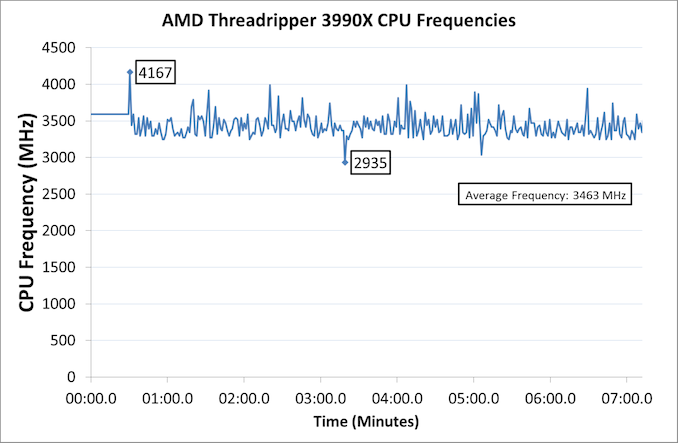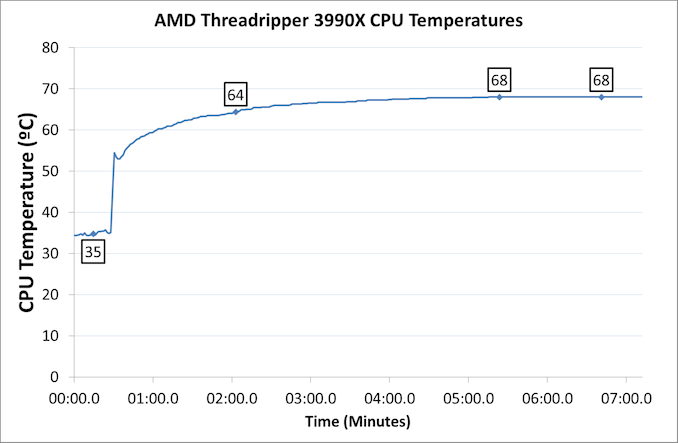The 64 Core Threadripper 3990X CPU Review: In The Midst Of Chaos, AMD Seeks Opportunity
by Dr. Ian Cutress & Gavin Bonshor on February 7, 2020 9:00 AM ESTFrequency, Temperature, and Power
A lot of questions will be asked about the frequency, temperature, and power of this chip: splitting 280W across all the cores might result in a low all-core frequency and require a super high current draw, or given recent reports of AMD CPUs not meeting their rated turbo frequencies. We wanted to put our data right here in the front half of the review to address this straight away.
We kept this test simple – we used our new NAMD benchmark, a molecular dynamics compute solver, which is an example workload for a system with this many cores. It’s a heavy all-core load that continually cycles around the ApoA1 test simulating as many picoseconds of molecular movement as possible. We run a frequency and thermal logger, left the system idle for 30 seconds to reach an idle steady state, and then fired up the benchmark until a steady state was reached.
For the frequencies we saw an ‘idle’ of ~3600 MHz, which then spiked to 4167 MHz when the test began, and average 3463 MHz across all cores over the first 6 minutes or so of the test. We saw a frequency low point of 2935 MHz, however in this context it’s the average that matters.
For thermals on the same benchmark, using our Thermaltake Riing 360 closed loop liquid cooler, we saw 35ºC reported on the CPU at idle, which rose to 64ºC after 90 seconds or so, and a steady state after five minutes at 68ºC. This is an ideal scenario, due to the system being on an open test bed, but the thing to note here is that despite the high overall power of the CPU, the power per core is not that high.
This is our usual test suite for per-core power, however I’ve condensed it horizontally as having all 64 cores is a bit much. At the low loads, we’re seeing the first few cores take 8-10W of power each, for 4.35 GHz, however at the other end of the scale, the CPUs are barely touching 3.0 W each, for 3.45 GHz. At this end of the spectrum, we’re definitely seeing AMD’s Zen 2 cores perform at a very efficient point, and that’s even without all 280 W, given that around 80-90W is required for the chipset and inter-chip infinity fabric: all 64 cores, running at almost 3.5 GHz, for around 200W. From this data, we need at least 20 cores active in order to hit the full 280W of the processor.
We can compare these values to other AMD Threadripper processors, as well as the high-end Ryzens:
| AMD Power/Frequency Comparison | |||||||
| AnandTech | Cores | CPU TDP | 1-Core Power |
1-Core Freq |
Full Load Power/core |
Full Load Freq |
|
| 3990X | 64 | 280 W | 10.4 W | 4350 | 3.0 W | 3450 | |
| 3970X | 32 | 280 W | 13.0 W | 4310 | 7.0 W | 3810 | |
| 3960X | 24 | 280 W | 13.5 W | 4400 | 8.6 W | 3950 | |
| 3950X | 16 | 105 W | 18.3 W | 4450 | 7.1 W | 3885 | |
The 3990X exhibits a much lower power-per-core value than any of the other CPUs, which means a lower per-core frequency, but it isn’t all that far off at all: less than half the power for only 400 MHz less. This is where the real efficiency of these CPUs comes into play.













279 Comments
View All Comments
kramik1 - Friday, February 7, 2020 - link
If I am not mistaken all newer AMD CPUs support ECC. It just depends if the motherboard BIOS will support it and get QA for it. Some users on Reddit were saying that even some B450 boards worked with ECC. I would be surprised if the board you were testing with didn't support it. It is not a feature that AMD sells like Intel.Ian Cutress - Friday, February 7, 2020 - link
ECC might work, but it's not validated. There's a difference there.Mikewind Dale - Saturday, February 8, 2020 - link
I have a Gigabyte X470 Aorus Gaming 7 Wifi with a Ryzen 7 2700X and KingstonKingston KSM26ED8/16ME (DDR 2666 ECC). The Gigabyte specifications page says it supports ECC. And indeed, when I run "cmd /k wmic memphysical get memoryerrorcorrection", the output indicates that ECC is working.
So just check your motherboard's specs, and if it says it supports ECC, you should be good to go.
willis936 - Friday, February 7, 2020 - link
I wonder if a linux host with a 128 thread windows client vm would have higher performance than running windows on bare metal.Ratman6161 - Friday, February 7, 2020 - link
Hmmm. could be interesting to install VMWare ESXi on it then create a VM with all processors assigned to it??Mikewind Dale - Friday, February 7, 2020 - link
Can I suggest you make a test where you run two instances of a given application? In many of these tests, 64 cores barely outperform 32 cores. However, that could mean that one instance of a given application has trouble using more than 32 cores. It may still be that two simultaneous instances of the same application could together use 64 cores effectively.For me at least, this is a realistic use case. I run statistical regressions in Stata, and one script file often contains dozens of different regressions to run. Now, Stata has a multicore version, licensed per core, which parallelizes the underlying linear algebra. But Stata also allows free trivial parallelization, in which each regression is run as a single-thread process, simultaneously. Stata does this by opening additional instances of itself in the background. So the user opens one instance of Stata, and then Stata opens an independent instance of itself in the background. Each regression is run on a different thread, in a different instance of Stata, and all the results are pooled together later.
My suspicion is that even when an application cannot effectively use 64 cores in a single instance, running two instances of the same application at once would be able to use 64 cores. I'd like to see a test of this.
Slash3 - Friday, February 7, 2020 - link
Small note, on page one in your Ryzen chart you list the 3950X as having only 32MB of L3 cache. As a dual chiplet CPU It has 4x16MB = 64MB of L3.Slash3 - Sunday, February 16, 2020 - link
...still not fixed, guys.Scipio Africanus - Friday, February 7, 2020 - link
As others may have said, this is a halo product. If it makes money great, otherwise break-even or even a small loss is fine. Audi doesn't need its R8 to be a cash cow, BMW doesn't need the I8 to make big bucks, or Acura for the NSX to rake in the dough, they have their core offerings for that. But these products exist to give the consumer something to be wowed by for the brand.iAPX - Friday, February 7, 2020 - link
Just to be clear, 3990x is the king but 3970x is the best performance/price option?This is incredible, AMD took the crown and is now the clear leader on some markets.